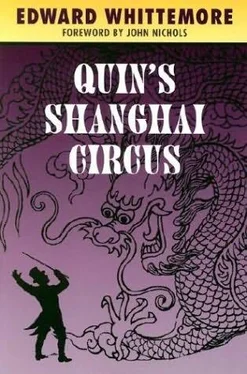Edward Whittemore - Quin’s Shanghai Circus
Здесь есть возможность читать онлайн «Edward Whittemore - Quin’s Shanghai Circus» весь текст электронной книги совершенно бесплатно (целиком полную версию без сокращений). В некоторых случаях можно слушать аудио, скачать через торрент в формате fb2 и присутствует краткое содержание. Жанр: Фэнтези, на английском языке. Описание произведения, (предисловие) а так же отзывы посетителей доступны на портале библиотеки ЛибКат.
- Название:Quin’s Shanghai Circus
- Автор:
- Жанр:
- Год:неизвестен
- ISBN:нет данных
- Рейтинг книги:3 / 5. Голосов: 1
-
Избранное:Добавить в избранное
- Отзывы:
-
Ваша оценка:
- 60
- 1
- 2
- 3
- 4
- 5
Quin’s Shanghai Circus: краткое содержание, описание и аннотация
Предлагаем к чтению аннотацию, описание, краткое содержание или предисловие (зависит от того, что написал сам автор книги «Quin’s Shanghai Circus»). Если вы не нашли необходимую информацию о книге — напишите в комментариях, мы постараемся отыскать её.
Quin’s Shanghai Circus — читать онлайн бесплатно полную книгу (весь текст) целиком
Ниже представлен текст книги, разбитый по страницам. Система сохранения места последней прочитанной страницы, позволяет с удобством читать онлайн бесплатно книгу «Quin’s Shanghai Circus», без необходимости каждый раз заново искать на чём Вы остановились. Поставьте закладку, и сможете в любой момент перейти на страницу, на которой закончили чтение.
Интервал:
Закладка:
Quin was leaning back in his chair, his eyes closed, when Big Gobi suddenly exploded beside him. A lump of seagull droppings had landed in his lap. He was shrieking and beating the deck.
Fuck suck kill , he screamed. Shit cunt triple sea cocksucker .
Quin grabbed him by the arm.
Easy, Gobes, remember the cross. It was a present to you. Remember the cross and think about that and forget the other things.
Big Gobi moaned. He lowered his eyes and wiped his hand with the seagull droppings on the back of his shirt. He was glad Quin was holding him by the shoulder because that meant that Quin liked him. Quin liked him and he wanted to do what Quin said, so he kept his head down and he stared at the cross, he didn’t look at the sea. But his anger was still so great that one of his hands, the one soiled by the seagull droppings, crept across the deck and took hold of a large metal fixture protruding from the bulkhead.
The hand squeezed, the flesh went white. The metal snapped, the fixture struck the deck. With one twist Big Gobi had ripped apart the thick metal fitting.
Quin watched the hand clutch the jagged edge where the fixture had been. He saw the fingers tighten once more, heard the flesh tear and the bones crack, watched the blood trickle down onto the deck.
He clamped his teeth together and pressed Big Gobi’s shoulder as hard as he could, pressed and waited, knowing nothing could be done because Big Gobi’s ageless childish brain was trying to save him from an even more impossible pain, trying to protect him from the overwhelming insults he had known in life by making him feel instead the shattering bones and muscles of his hand.
When they arrived in Tokyo Quin wrote to Father Lamereaux explaining who he was, who was with him, and why he had come to Japan. Then he went to the bar where Geraty had said he could be found.
Most of the men in the bar were foreigners, several of them long-term residents of the country. Geraty had not been seen there in over six months, not since before his trip to New York, but it seemed this sort of absence was not unusual for him. No one was aware that he had been out of the country. Over drinks Quin learned a good deal about both Geraty and Father Lamereaux.
At the beginning of the war, he was told, Father Lamereaux had been interned in a special prison camp, a former mountain resort where a few Western scholars and missionaries were sent, friends of Japan who were now enemies because of the color of their skin. It was there that the renegade priest had become a drunkard, a minor scandal compared to others he had known.
Before the war, in particular, he had been notorious for the ever-changing procession of young acolytes who followed him through the streets on Friday at sunset on the way to his Victorian house, there to be entertained by him far into the night.
The priest was either a Canadian or a Belgian. He had arrived in Tokyo so long ago no one was quite sure of his origins. When he first came to Japan he studied No plays and Buddhism, in the Jesuitical tradition, in order to be able to wrestle with his theological opponents. He took instruction for ten years in the Buddhist temples of Kama-kura, coming to accept the fact that Gothic steeples were unsuitable in a land of earthquakes, learning to bend his beliefs as bamboo bends, again perhaps in the Jesuitical tradition.
Soon after he went to Kamakura there were rumors that his love for nature and his appreciation of No had lured him into becoming a practicing Shintoist.
Later there were more serious rumors that he had deserted his church altogether and taken Buddhist orders of initiation.
Lastly there was his alleged crime of having collaborated with the enemy by informing on his fellow Westerners.
Throughout the period prior to the war, supposedly, he had submitted regular reports on foreigners in Tokyo to the Kempeitai or secret military police, Japan’s principal intelligence and counterespionage agency. The evidence against him, considered conclusive, had been gathered over the years by a number of Westerners familiar with the operating techniques of the Kempeitai.
The story began when Father Lamereaux was called in for an interview with the Kempeitai.
This in itself was not exceptional. At the time, most Westerners living in Japan were periodically questioned or put under surveillance by the Kempeitai. But when they were questioned it was generally under some other guise, the Kempeitai officer posing as a civilian in a government office where the foreigner went on routine business. Only in the case of a man who had many government contacts and traveled frequently in and out of the country, such as a journalist, might the interview be conducted by an officer in uniform for purposes of intimidation.
Father Lamereaux never left the country. He traveled no farther than Kamakura and had no government contacts whatsoever. Yet when he was called in by the Kempeitai the interview was conducted not only by an officer in uniform but by a general in uniform, and by no less a general than Baron Kikuchi, the hero of the 1905 Russo-Japanese War who was thought by many to be the most powerful man in the secret police.
Astonished by this, several journalists later asked Father Lamereaux in private to tell them what had happened. The Jesuit spoke directly and succinctly as was his manner, quoting the entire conversation verbatim.
Baron Kikuchi was a tiny man. Father Lamereaux was tall, and his gaunt figure gave him an appearance of even greater height. The General had therefore not gotten to his feet when Father Lamereaux entered the room. He stayed behind his massive desk and pointed to a chair. The chair was small and low so that it would be impossible for a guest to arrange himself comfortably. Father Lamereaux had not missed the fact that the desk was bare, the General’s way of saying he knew everything he wanted to know about the priest without consulting his dossier.
The General spoke curtly, using the verbs and pronouns that were only appropriate when a man was speaking to his wife, to a child or servant or animal. Father Lamereaux had three choices. He could accept the gross insult and answer as an inferior speaking to a superior. He could use the same forms of speech and return the insult. Or he could ignore the insult and speak as an equal to an equal.
He chose the last to show that he had nothing to hide and to prove that he was in complete command of his emotions no matter what the situation, an approach the General might find slightly humiliating after having adopted a superior pose. The strategem worked, for the General subsequently switched to Lamereaux’s idiom.
Sit down.
Thank you.
How long have you been in this country?
Over ten years.
What have you been doing?
Pursuing my Buddhist studies.
Where?
Kamakura.
Why?
In order to gather the skills necessary for my missionary task.
What makes you think you have a missionary task here?
God’s task is here and everywhere.
Does it include what happened at your house last Friday night?
There was a meeting for religious instruction.
And the Friday night before that?
Yes.
The Friday night six months ago?
Yes.
How does it include all those Friday nights?
Because the meetings for religious instruction are always held on Friday evenings.
Night I said, not evening. What do you do with these young boys after you have finished your religious instructions early in the evening?
Sometimes we have a discussion on some topic.
What?
Generally some aspect of No drama.
Does one or the other of you act out a part?
We may.
Why?
Читать дальшеИнтервал:
Закладка:
Похожие книги на «Quin’s Shanghai Circus»
Представляем Вашему вниманию похожие книги на «Quin’s Shanghai Circus» списком для выбора. Мы отобрали схожую по названию и смыслу литературу в надежде предоставить читателям больше вариантов отыскать новые, интересные, ещё непрочитанные произведения.
Обсуждение, отзывы о книге «Quin’s Shanghai Circus» и просто собственные мнения читателей. Оставьте ваши комментарии, напишите, что Вы думаете о произведении, его смысле или главных героях. Укажите что конкретно понравилось, а что нет, и почему Вы так считаете.












